Key takeaways
- The core difference between wholesale vs retail is wholesale involves selling products in bulk to other businesses (B2B), while retail focuses on selling individual products to end consumers (B2C).
- When you sell products wholesale, you face less risk and lower overhead costs, reducing carrying costs and shipping expenses. In contrast, retailers face higher overhead costs due to the need for storefronts and a larger workforce.
- Retailers enjoy higher per-unit profit margins than wholesalers due to the added risk they take on.
- Some things to consider when choosing between wholesale and retail are product type, profit margins, overhead costs, customer relationships, marketing, and inventory management.
- Wholesalers rely on B2B marketing through trade shows and networking, while retailers focus on advertising and sales promotions.
- Some companies can successfully operate with a hybrid approach, acting as both wholesalers and retailers.
Wholesale and retail are two fundamental pillars of the supply chain, and each comes with its own challenges and benefits. While these business models generally have similar foundations, getting physical goods into the hands of the consumer, they differ significantly. Whether you’re an aspiring entrepreneur or a seasoned business owner, understanding the difference between wholesale and retail can significantly impact your business decisions.
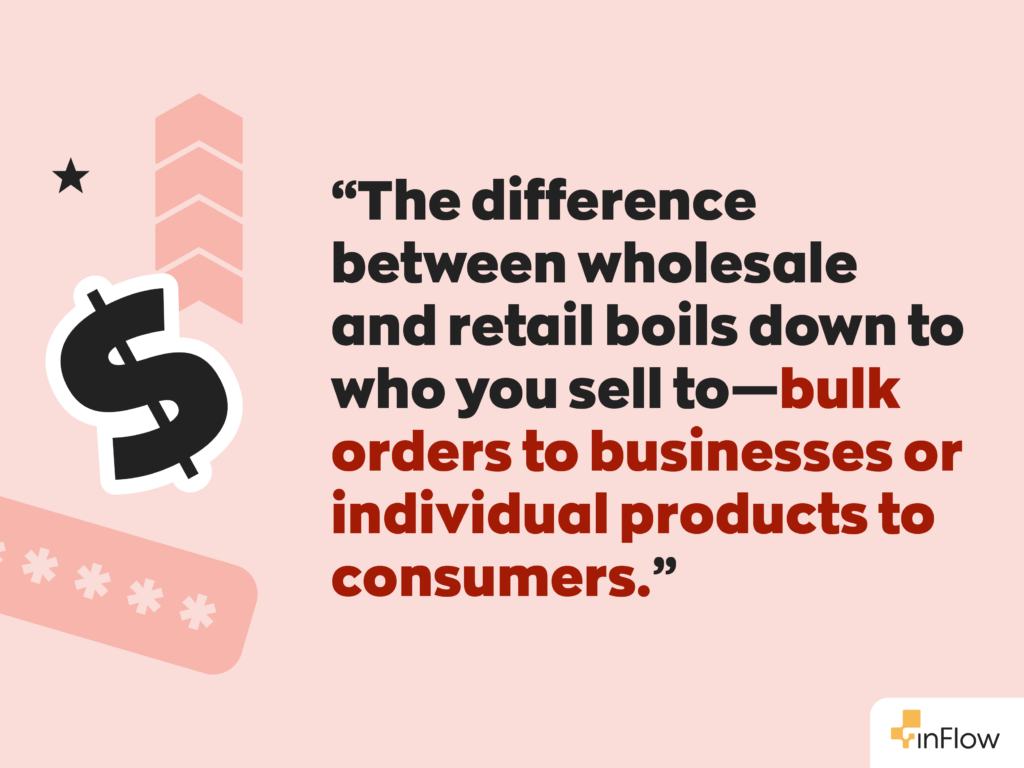
In this article, we’ll explore the key differences between wholesale vs retail, the challenges and benefits each offers, and how businesses can decide which model aligns best with their goals.
What is wholesale?
As a consumer, you may have wondered where retail chains like Walmart and Target get all their products. After all, they offer a wide variety of products, ranging from food items to pharmaceutical medicine. They very clearly don’t manufacture everything in-house.
That’s where wholesalers come in. Wholesalers sell products to other businesses in bulk at a discounted rate. Those businesses then sell those products directly to individual customers at a markup. Wholesalers typically charge less per item than retailers because they sell products in large shipments, which reduces carrying costs and shipping fees.
In general, selling wholesale carries less risk. Selling things in bulk makes moving products easier and means storing them for less time. Wholesalers also don’t have a physical storefront, further lowering overhead costs. This also reduces the need for staffing, which in turn reduces labor costs.
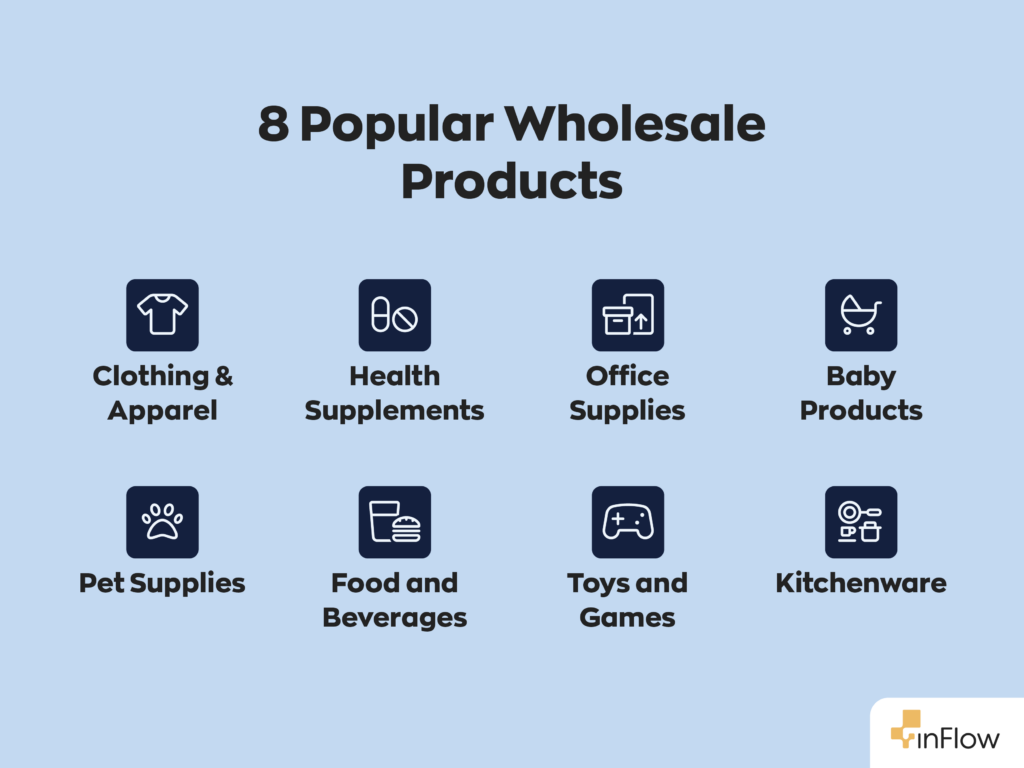
On the other hand, selling in bulk to retailers can be difficult. A business-to-business (B2B) model requires building relationships, which can take a lot of time. And once you have those relationships, you’ll need to maintain them.
What is retail?
We mentioned Walmart and Costco above because they are quintessential examples of retailers or a business-to-customer (B2C) model. Retailers purchase products in bulk from wholesalers, mark them up, and sell them to consumers. They play a significant role in the global supply chain because they are the ones who get the products into the hands of the consumer.
Selling retail vs wholesale can be challenging because having a product and being able to sell it are two very different things. Marketing your products to customers ultimately decides whether or not they sell, which can sometimes be expensive.
Retail also involves more risk because you sell products individually. This means you hold products longer, adding storage costs and opportunity costs. Displaying and selling one product means that they can’t sell another at the same time.
On average, retail has higher overhead costs. You need a storefront and somewhere to store the products that are not currently on the shelves. You’ll also need staff to handle day-to-day operations and more robust payment processing for things like returns.
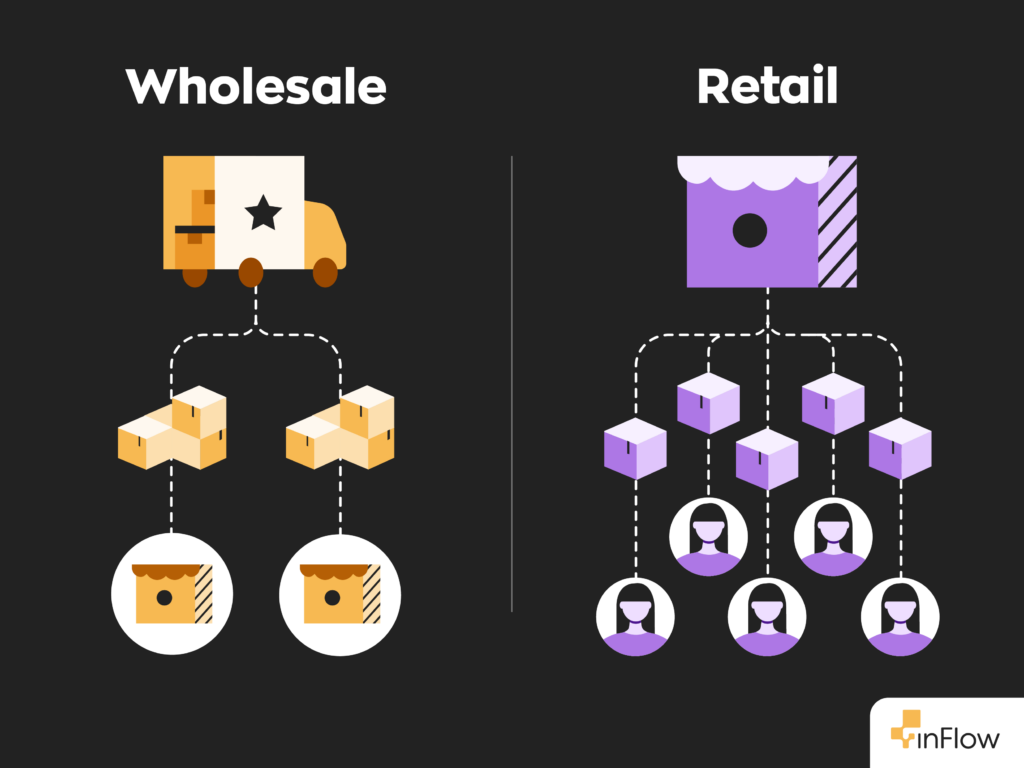
Retail vs wholesale: which is right for you?
We can’t tell you specifically which model is best for your business. That will depend on a lot of different factors. However, we can give you some things to consider when deciding between wholesale vs retail.
- Product type—A good rule of thumb is that wholesaling works well with essential items, like food or clothing. Consumables, in particular, are great since you know they must be replenished, which means repeat business. However, consumables also often have expiration dates and lot/batch numbers to worry about.
- Profit margins—Wholesalers will get a lower per-unit profit margin than retailers, but they typically get a higher sales volume. While retailers enjoy higher per-unit profit margins, they also have higher overhead costs.
- Overhead costs—These expenses are arguably the most important difference between wholesale and retail. Typically retailers will have to worry about more overhead costs than wholesalers, which will eat into their gross profit margins.
- Customer relationships—While wholesalers don’t deal with the end consumer, they still manage customer relationships. In this case, their customers are the retailers they supply with products. The relationships may be different, but both require work to maintain.
- Marketing and Branding—Depending on whether you sell wholesale or retail, attracting people or businesses to your products will require a different approach. Wholesalers tend to rely on B2B marketing through trade shows and networking events. Retailers, on the other hand, focus on advertising, social media, and sales promotions.
- Inventory management—Both retailers and wholesalers will need to manage inventory, but the challenges differ. For example, wholesalers will likely need a larger warehouse space, potentially multiple locations, to store large quantities of products. Retailers might not have to store as many products, but they’ll likely have a much more extensive selection of products to manage.
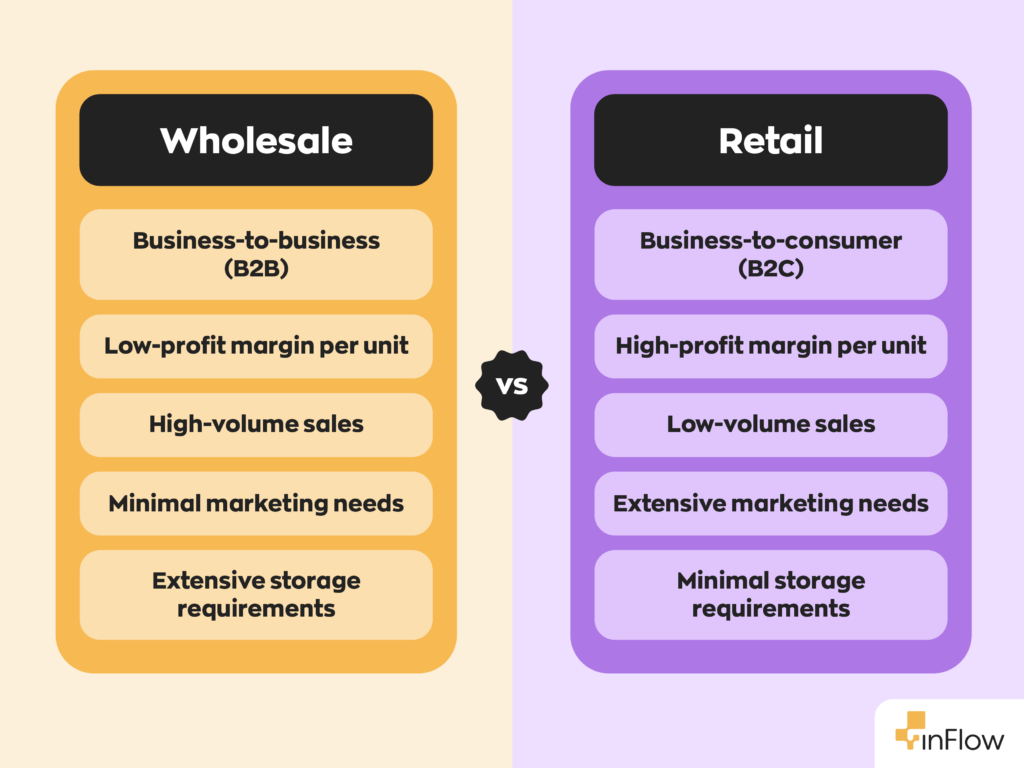
Wholesale vs retail: why not do both?
Of course, many companies act as both wholesalers and retailers. Take Nike, for example. While it has its own stores, it also sells its products in bulk to other retailers. While the scale on which they do this may be unattainable for most small businesses, it doesn’t mean it’s entirely out of reach.
Many retailers have found success selling their products wholesale online while still offering their goods to the individual consumer. This hybrid business model provides the benefits of selling wholesale and retail. You’ll be able to have the peace of mind that large wholesaler shipments provide but also benefit from the high per-product profit margins that retailers enjoy. However, you’ll also need to manage the challenges of both business models.
For example, you’ll need to account for different pricing schemes for your products based on which customer you’re selling them to. You’ll also need to track your inventory across multiple sales channels to ensure you’re not overselling. Thankfully, our software inFlow can do all that and a whole lot more, such as barcodes and real-time inventory tracking.
Ultimately, when deciding between wholesale vs retail, you’ll need to consider the products you carry, what problems they solve, and your business goals.
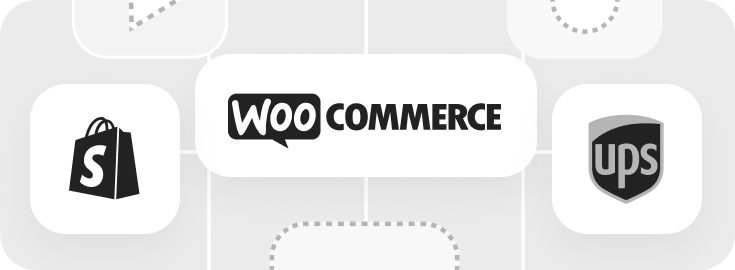

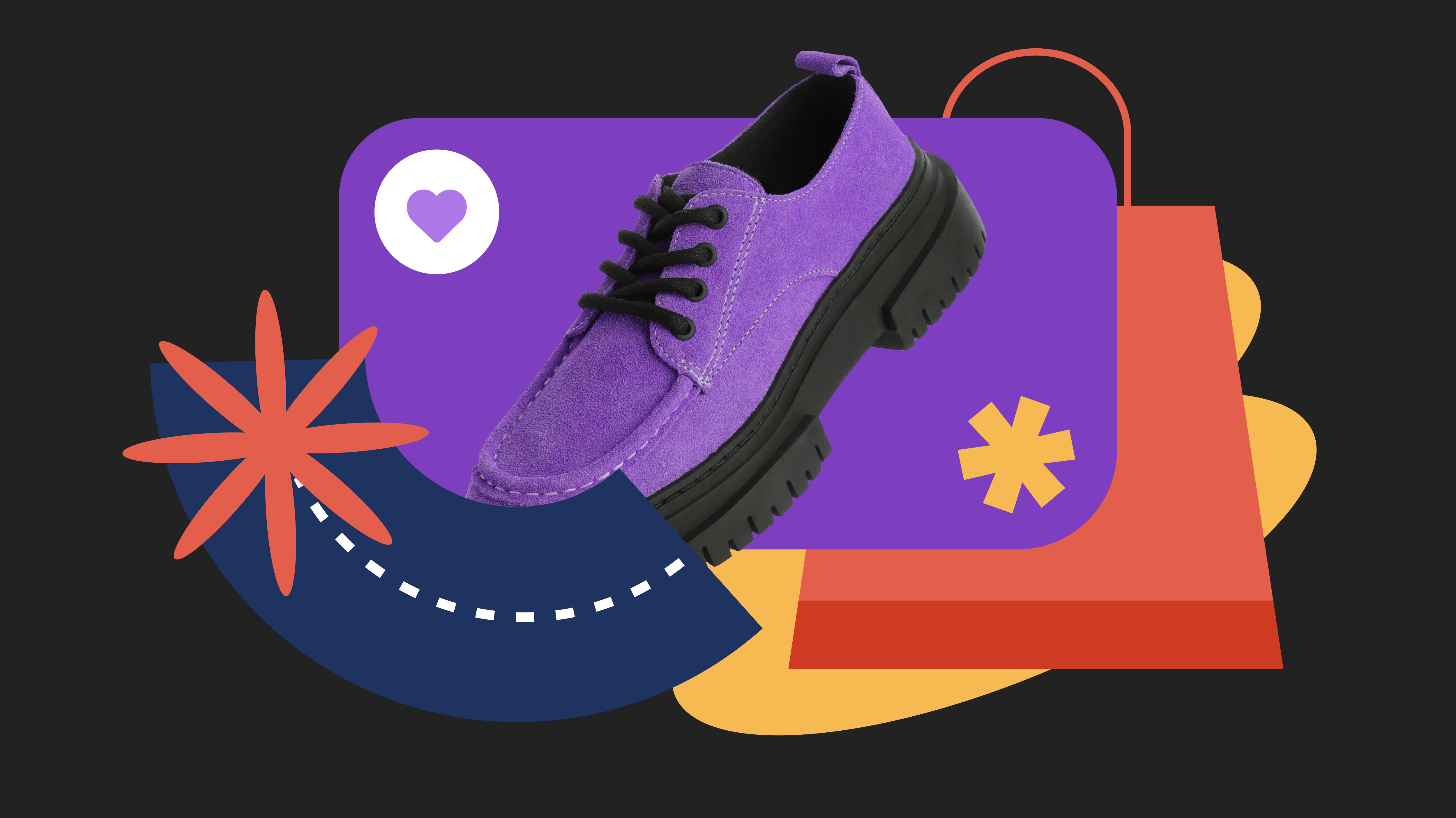
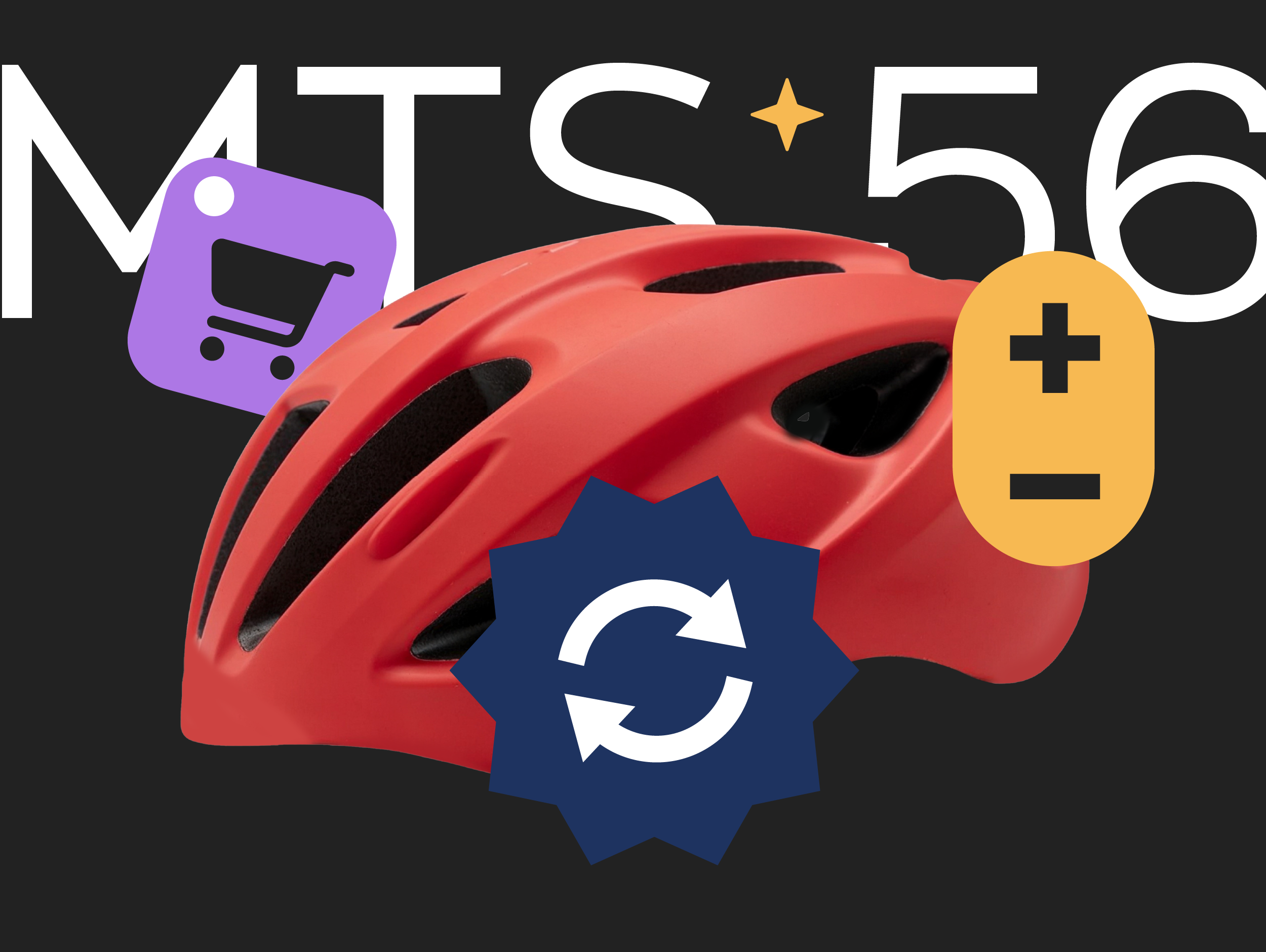


0 Comments